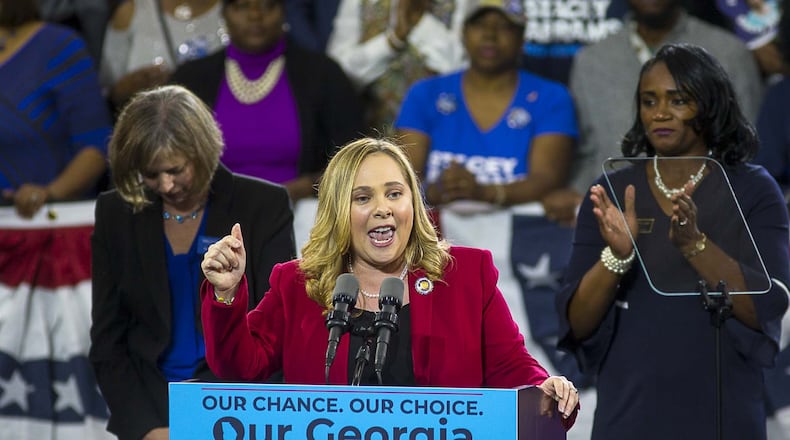Sarah Riggs Amico’s biggest business setback is as much a part of her pitch for the U.S. Senate as her private-sector experience. The financial struggles of the car-hauling firm she ran is embedded in her biography and the clincher, she tells voters, for her decision to challenge Republican David Perdue.
Amico entered the contest weeks after the company, Jack Cooper Ventures, filed for bankruptcy citing mounting pension obligations and steep labor costs. And she uses the firm’s turbulent path to try to connect with voters who are facing their own financial hardships during the pandemic.
“Think about the moment we’re in, with COVID, and how many businesses are struggling to survive,” she said the other night at a town hall with Columbia County Democrats. “I know how hard it is. I’ve literally been there.”
>> Guide: Where U.S. Senate Democratic candidates stand on the issues
>> Related: Ossoff applies lessons from 2017 loss to bid this year for U.S. Senate
>> Related: Tomlinson says she's ready for the U.S. Senate, having already governed
The emphasis on her business experience coursed through her last campaign, too, a 2018 bid for lieutenant governor. A political newcomer, she swept aside a little-known challenger to win the party’s nomination before losing narrowly to Republican Geoff Duncan.
Back then, she told audiences about how her family transformed a small auto hauler company into a national firm that employs 3,000 people. Now she talks about how the bankruptcy deal assured that the staffers, many of whom are union members, avoided cuts to their wages or health benefits.
She highlights the bankruptcy, too, with her appeals to organized labor. Despite the declining clout and membership of labor unions, they remain central to Democratic politics in Georgia. And Amico's first campaign event was held at a picket line with AT&T workers who were on strike.
Amico heads toward the June 9 primary on uncertain ground. After a 2018 midterm campaigning alongside Stacey Abrams, Barack Obama and other party elite, her best chance of winning the party’s nomination is to force a runoff.
Her top rivals are Jon Ossoff, the owner of an investigative journalism firm, and former Columbus Mayor Teresa Tomlinson.
Ossoff has been leading recent polls, while Amico and Tomlinson were running neck and neck for the No. 2 spot in The Atlanta Journal-Constitution’s March survey of the race.
Both Ossoff and Tomlinson have also nabbed more endorsements and campaign cash than Amico.
Amico has responded by dipping into her wallet to finance her campaign with at least $750,000 in loans, which helped fund a recent minute-long ad that highlights her previous run for statewide office and her business bona fides.
“I am a battle-tested executive in a tough economy,” she said.
‘Not rocket science’
The 2018 bid is another undercurrent of her Senate run, and she reminds voters of the fruits of that campaign: a close allegiance to Abrams, a rising star in the national Democratic Party who lost the race for governor; and an endorsement from Obama in that same campaign.
The latter helped counter attacks accusing her of being a closet Republican, in part because of her past contributions to Mitt Romney and other GOP candidates. But it's her ties to Abrams she most aggressively advertises, though the former state House minority leader has remained neutral in the race.
Like Abrams, Amico has pushed an unapologetically liberal approach. She supports raising the minimum wage, passing stricter gun control legislation, expanding voting rights measures and creating a “public option” to let people buy coverage in a government-run health care plan with the goal of increasing competition.
In the aftermath of Ahmaud Arbery’s shooting death, Amico has emphasized her calls for widespread criminal justice overhauls that would end cash bail, shift resources toward treatment programs and away from prison beds, and boost funding for community policing initiatives.
And she’s used the pandemic as a springboard to amplify her calls to combat climate change, reduce income inequality and bash Republican-led moves to ease coronavirus restrictions as a “fool’s errand” that will inevitably lead to a second wave of the disease.
When it comes to her campaign approach, the Harvard-trained business executive also leans on the Abrams playbook.
She tells crowds she can build on a foundation that Abrams established two years ago, when she narrowly lost to Republican Brian Kemp while capturing more votes than any Democrat who has run statewide in Georgia.
“I’ll give Stacey the credit for the strategy,” Amico said, “but I’ve got to tell you, I was proud of helping to execute it.
“It’s not rocket science. We had a leader that understood to win a statewide election, you go everywhere and you talk to everyone. And that’s the kind of campaign I’m going to do again.”
About the Author
Keep Reading
The Latest
Featured




